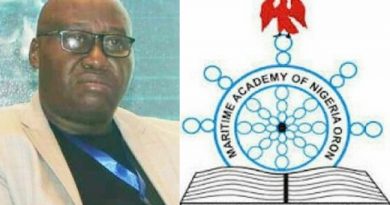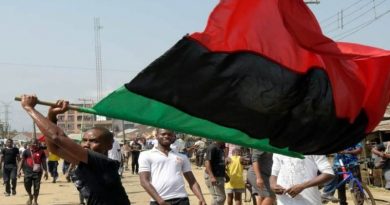End This Almajiri Practice Now Or Experience A Bomb In These Out of School Children Todaye
The lower chamber of the National Assembly, at its March 12 plenary, discussed the issue of over 13 million out-of-school children, which has put the nation in a bad light, writes TONY AKOWE.
The lawmakers were fresh from the Christmas break. House of Representatives Speaker Femi Gbajabiamila drew his colleagues’ attention to the growing number of out-of-school children, which the United Nations Children’s Fund (UNICEF) estimated at about 10.5 million. The Universal Basic Education Commission (UBEC) put the number at 13.2 million. Ranging between the ages of five and 14, the Speaker told the lawmakers that “we cannot escape the conclusion that we have on our hands a huge problem, a clear and present danger the consequences of which are too dire to ignore.”
Gbajabiamila expressed concern that “on our streets, legions of children beg for alms from sunup till past dusk”. “These millions of young people with neither the training nor the awareness they need to survive, to contribute to, and to benefit from the 21st-Century knowledge economy are victims of the broken promises of our nationhood. They are at risk of exploitation, vulnerable to recruitment by human and organ traffickers, by criminal elements, and insurgents. Their fate is inextricably bound to the fate of Nigeria. If we work to give them a future of prosperity and progress, we will achieve the same outcomes for Nigeria. If we condemn them to a future of deprivation and exploitation, that too will be our collective fate,” he said.
The Speaker said the growing number of out-of-school children should be of concern to Nigerians, describing it as a time bomb waiting to explode. He believed that it was not enough to provide classrooms without providing adequate teachers to teach and a conducive environment for the children to learn. The Speaker, who said members of the House should take time out of their legislative schedule to return to their constituencies to carry out comprehensive enlightenment on the importance of education, said it was unfortunate that reforms carried out by the government in the education sector have not yielded the desired result, adding that Nigeria cannot eradicate poverty, meet the challenges of insecurity, defeat ignorance and strife if the people do not have access to basic education.
According to him, millions of children, who are out of school and who are denied their fundamental right to receive the training and skills acquisition opportunities, deserve the best life can give them. He said: “We must consider the failures of policy development and implementation, the vagaries of culture and religion that have contributed to the plight of these young people. We are here to advance solutions to this problem. We must act in the best interests of our people by ensuring that the solutions presented here today are formulated into actionable policy plans to be implemented diligently, with haste. This is a commitment that we made in our Legislative Agenda, and we will live up to this and all other commitments, which we have freely made before God and the Nigerian people, who have chosen us to represent them here in this hallowed chamber. In too many parts of the country, the school attendance rates have not improved, and the quality of education being received by those who enroll and attend still falls far short of our most fundamental expectations. We must consider that perhaps the time for a massive course correction has come.”
Coming under a motion under matters of urgent public, Hon. Omowumi Olubunmi Ogunlola, representing APC, Ekiti, said the House should take note of the fact that education is a source of knowledge, which has the potential to change the immediate environment and the world in general into something better and can be used to uplift or elevate the social and economic conditions in our society. She argued that education can be likened to oxygen in the human body, adding that a nation with a large number of her people lacking quality education is akin to a nation without life. Hon. Ogunlola stressed that education is the surest means of raising millions of people out of poverty and offering them a chance to live full lives of personal achievement in the 21st-Century knowledge economy. In her opinion, the figures of out of school children provided by the United Nations Children’s Fund and Universal Basic Education Commission is a clear evidence of a national crisis of severe proportions that unless urgent action is taken, the nation will be at risk of a lost generation of young people.
According to her, it was unfortunate that after years of expensive interventions, the government has not achieved any sustained reduction in these statistics, adding that the possibility still exists that the numbers will get worse in the coming years.
Corroborating the Speaker, she said across the country, many of our children, who are supposed to be in school, are roaming the streets as beggars and petty hawkers; while others are employed in menial roles while others become victims and perpetrators of crime. She is concerned that millions of these children will soon age out of the criteria for consideration as children, without being equipped with the basic communication and arithmetic skills they need to pursue further education opportunities or to find and keep meaningful employment and will be forgotten and left to fend for themselves.
Hon. Ogunlola argued that the numbers of out-of-school children include those under the Almajiri system, as well as others who, due to economic, cultural and social factors, including refugee status, are unable to take advantage of the educational opportunities currently available. She stressed that if the high number of out-of-school children in Nigeria is a result of either a failure of policy or failure of implementation or both, “we cannot keep doing the same thing and expect anything different”. “By failing to ensure that these children are in school, we are in effect raising a generation of victims and victimisers, potential criminals and insurgents with the manifestations of the worst possibilities already being with us, and promise to become even more severe with time without immediate determined and urgent action,” she said.
Minority Leader of the House Ndudi Elumelu believed that it should not be all talks without action. He said members of the House should be prepared to make sacrifices for their constituents, who do not have the means to send their children to school. Elumelu said members should sacrifice funds from their allowances and salaries to sponsor out-of-school children in their various constituencies.
He said: “All of us here and the political class, in general, have the responsibility to sponsor out of school children in our various states. We can do this. We lawmakers do this by setting aside funds from our allowances or salaries to sponsor these out-of-school children. So, let’s not think of what the government can do for us, but we should rather think of what we can do for our country.”
“Today, Elumelu Foundation founded by my brother is helping children and youths in Nigeria and across Africa and I believe we can do the same for our young people. Let’s not also forget that the former President, GoodLuck Jonathan introduced Almajiri school shortly before his exit what has happened to that project,”? he asked. But Elumelu’s suggestion appeared not to have gone down well with some members, who began to grumble immediately he made the suggestion.
Deputy Minority Leader, Toby Okechukwu said the nation’s 200 million population was an asset, which can also turn into a burden if not properly educated. He said the difference between a child in school and the one out-of-school or the Fulani man tending to his cattle and the one holding top political office is all about education. He said while the constitution has spelt out what needs to be done, several cultural and religious practices tend to impede education in some parts of the country. He said while the Almajiri system gives religious education, it does not teach the required skill to move on in life and expressed the belief that children under the system can be made to acquire conventional education in the morning and add the religious education later in the day.
Hon. Nasir Ali, representing APC, Kano, said one of every five children in the country was not in school. He expressed concern that out of the figures of out-of-school children, 75 percent of them are from the north. Several other lawmakers like James Faleke, Sada Soli, Tajudeen Abbas, Abdullahi Saeed Abdulkadir, Aisha Dukku, Wale Oke all spoke in the same vein. While Hon. Aisha Dukku countered the calls by some members that the Almadjiri system of education should be abolished as the system was already bastardised, Hon. Oluwole Oke, said the out-of-school problem was borne out of corruption. He said: “For me, all the problems mentioned here by various speakers are not the issue, rather what seems to be the basic issue here is corruption.” Some other lawmakers called for the domestication of the child rights act and criminalising child labour in the country.
The House, however, decided to carry out comprehensive investigations into all Federal Government expenditure in the funding of basic education in the last 10 years to identify why no major impact has been recorded. The investigation, which is part of the resolutions adopted by the House after over four hours of debate on the state of out-of-school children in the country, is also to determine how these funds were spent, what they were spent on; and the status of all ongoing capital projects by the Universal Basic Education Commission (UBEC) across the country. The House also resolved to convene a special public hearing to receive and consider the views, submissions, and concerns of stakeholders and citizens, on the matter of out-of-school children in Nigeria to identify the unique cultural, religious, social and economic factors that cause school dropout and failure to enroll children in school across the country.
Also, they resolved to carry out a holistic investigation into issues of Nigeria’s out-of-school children to ascertain among other things, the current figure of out-of-school children in Nigeria, including specific numbers in each state of the Federation. They also believed that there was the need to amend the National Youth Service Corps (NYSC) Act to establish a program to identify, recruit and train willing, capable and promising young Nigerians to serve as teachers in underserved areas.




